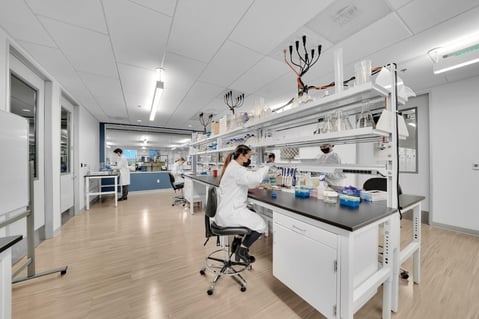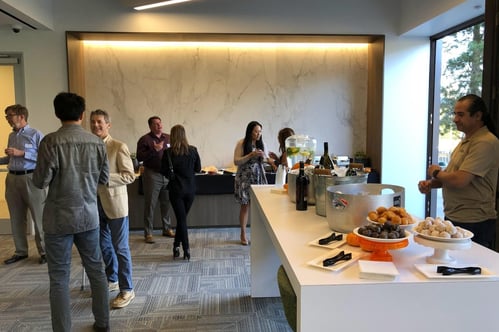Research is a form of study or investigation that intends to explore specific fields using methods, different types of research, and designs to discover. These findings are used to conduct further research, which leads to a deeper understanding of the field. Therefore, the ultimate purpose of a researcher is to actively search for and provide more information on a specific topic.
The role of undergraduate research involves working under a graduate student, who acts as a supervisor/mentor, to accomplish and tackle their proposed research question. The graduate student gives guidance in the form of techniques, methods, or protocols. These tasks are followed to equip their undergraduate with the necessary skills to successfully carry out research.
This article covers what these undergraduate research positions look like and how to land such opportunities.

The first step to finding research is thoroughly understanding the types of research available. Knowing what forms of research are available can make it easier to choose what best aligns with your interests and strengths. Different types of research can include:
Quantitative research focuses on quantifying data based on the collection and analysis of numerical values. In this stream of research, the numerical data is analyzed for patterns. These patterns are interpreted using detailed logic and help frame an objective stance or conclusion based on the reasoning developed. Quantitative research may include surveying, correlation research, causal-comparative research, or experimental research.
Survey-based research collects information from a pool of respondents using either exploratory, descriptive, or casual surveys. Exploratory research may be found in marketing or business and often focuses on the discovery of new ideas and insights based on correlations or common trends. Descriptive research is strategically preplanned and structured so that the information collected can always be statistically inferred from specific populations. Casual research is also preplanned, however, the statistics provided are used in attempting to explain the cause-and-effect relationships between the variables and how they impact one another.
Experimental-based research can be both wet-lab experiments or dry experimentation. Wet-lab experiments involve drug chemicals and other biological matter that can be analyzed and tested using various liquids. In contrast, dry-lab experiments focus on applied or computational mathematical analysis via computer-generated models or simulations. Despite the form of experimental research being conducted, both follow basic principles.
Make an observation.
Create a series of questions.
Form a hypothesis that answers these questions.
Design written experiment protocols that can support your hypothesis.
Draw conclusions based on experiment results.
Analyze the data to check if it proves or refutes your claim, or contains new information.
🔬 Learn about: Wet Lab vs. Dry Lab for Your Life Science Startup
Qualitative research relies on one-to-one interviews to better understand people's beliefs, experiences, behaviors, responses, and overall interactions. This descriptive data attempts to answer how and why by focusing on the humanistic or idealistic approach and pays special attention to the social parameter details, thus giving a greater depth of interpretation to the quantitative measured data. Collecting qualitative research can be accomplished using in-depth interviews, documents, focus groups, and case-study research.
In-depth interviews should be conducted with the intent of considering the population. The population matters because this will differentiate their experiences, thus changing their responses to the interview. For example, if you are doing research in healthcare, you would ask a doctor or physician. After picking out an interviewee, ensure the research question is clear as it will help develop a checklist of questions to be asked during the interview. With that said one should be skillful or have great interview techniques. Interview skills include:
Expressing clearly the purpose of the interview.
Start with a neutral question to facilitate a free-flow conversation packed with information.
Using open-ended questions, not ‘yes’ or ‘no’ allows the respondent to choose their answer.
Limit the content of each question to a single idea to avoid confusion.
Do not influence the respondent by asking leading questions.
If you have not understood the response, ask the respondent to repeat and clarify.
Do not assume answers or pass judgment on the answers.
Avoid irrelevant discussions.
Keep the interview short (15-30 minutes).
At the end of the interview summarize the points reported and ask the respondent if it is correct.
Conducting interviews in this way provides valuable information that will explain and explore research subjects' opinions, behavior, experiences, and/or phenomenon.
Case studies can be collective, descriptive, and explanatory. No matter which type of case study is used, all include detailed information about a specific subject, such as a person, group, place, event, organization, or phenomenon, and are used to generate an in-depth, multi-faceted understanding of a complex issue in its real-life context. The importance of a case study is that it captures a range of perspectives, as opposed to a single view. Introducing a broad viewpoint allows for gaining a greater understanding of the subject at hand, thus reducing the potential for any bias, and providing a look at life through the lens of these individuals.
When deciding on a best-fit research position, consider exploring why this research is a good fit for you. It is important to understand how you fit into the research being done and what you can gain from such an opportunity. Questions that might help make this formal decision include:
Asking these questions early on by researching research will provide a clear vision of what you are looking to gain from this experience.

After establishing what laboratories you are interested in, the next step should be making contact with the principal investigator. Talking to the principal investigators will provide you with better insight into the research being done and you can also learn more about each of the graduate student's projects. Contacts can be accomplished through your network:
A few tips to keep in mind with each contact.
Teacher Assistants
If you have a teacher assistant whose lab research you are interested in, talking to the teacher assistant directly will allow them to know you personally. Since, the teacher assistant will already know you academically, knowing you as a person is an additional gauge of your research potential. More often than not, your teacher assistant will be willing to mentor you as their undergraduate researcher, if you try asking.
Research Support Programs
If you find a program that supports undergraduate research such as the Undergraduate Research Opportunities Program (UROP) is a great way to begin getting involved with research. While these resources are application based, they can open many doors. UROP’s mission is to integrate undergraduate students into the research culture of their respective universities by providing opportunities for faculty and students to work together on research projects. Usually, UROP fellows will be granted additional resources that allow them to network with professors on their campus. Being provided with this network opens additional resources into being involved with research and how your supporters can help. Moreover, these undergraduate research programs can supply funding and services that build upon the future of research. That said, most schools have UROP or a similar program that aims to foster the undergraduate research engagement experience. A few names you might look out for at your university include:
Department Emails
Department emails are often the most underutilized resource because they are ignored. Please read your departmental emails. Almost all departmental emails contain news about professors' groundbreaking research and simultaneously advertise their work. Many of these announcements will also state they are seeking help from undergraduate students with the intention that students will reach out.
Community Opportunity Programs
Community-based opportunity is another potential route if you fit the qualifications. Most of these programs focus on enhancing research opportunities for historically marginalized populations as a means of increasing diversity and inclusion through research exposure. These community research programs might have qualifications such as being a first-generation student, low-income student, transfer student, or student from specific demographics/groups that are underrepresented in graduate education. Examples of community opportunity research programs include:
Principal Investigator
This might be one of the best pathways into research. Keep in mind, principal investigators are usually professors, so you could take their courses. Taking their course will allow them to know you as a student, but is not always necessary. It is undervalued how happy a professor is to mentor students and share their research. Coming from a graduate student, a principal investigator once said “Just ask, because the worst a professor can say is no.” This response cannot be more true, as most professors usually say yes if they need the help, or they will direct you to a colleague they believe will be of help. No matter the answer, making direct contact with the principal investigator is a great way to cut out the middleman. To approach the principal investigator, start by sending an email introducing yourself. That email should contain:
🔬 Read: 11 Reasons Why Networking is Essential for Any Startup

After successfully making contact with the researchers, please keep in mind there might be an interview. The purpose of these interviews is to gauge how you fit into the lab and with the other lab members, who should be seen as your coworkers. Since every lab is different you must enjoy the lab work along with the lab environment dynamics. Therefore, while you may be interviewing with the lab, the lab is also interviewing with you. The researchers at this point are no longer interested in your technical abilities but in your soft skills. It is meant to show how to communicate with your lab mates and the principal investigator. Questions that might be asked include:
If all goes well, congratulations! You have been invited as an undergraduate researcher into a lab. Now that you have joined an undergraduate research position there are two final notes to keep in mind.
First: If you end up not liking this opportunity it is okay to start over and find a different research position or ask your principal investigator for a different project.
Second: If you do like the research environment, stay as long as possible. Perseverance, drive, and growth are all attributes of a great researcher and it is better to show you were in one research position for a longer period than multiple positions for short periods.
Good luck searching for your undergraduate research opportunity. May the best study for you be around your corner.
Download The Ultimate Guide to Wet Lab Incubators in Southern California, a handbook to assist life science start-ups through the entire decision-making process to find wet lab space.
Download Now